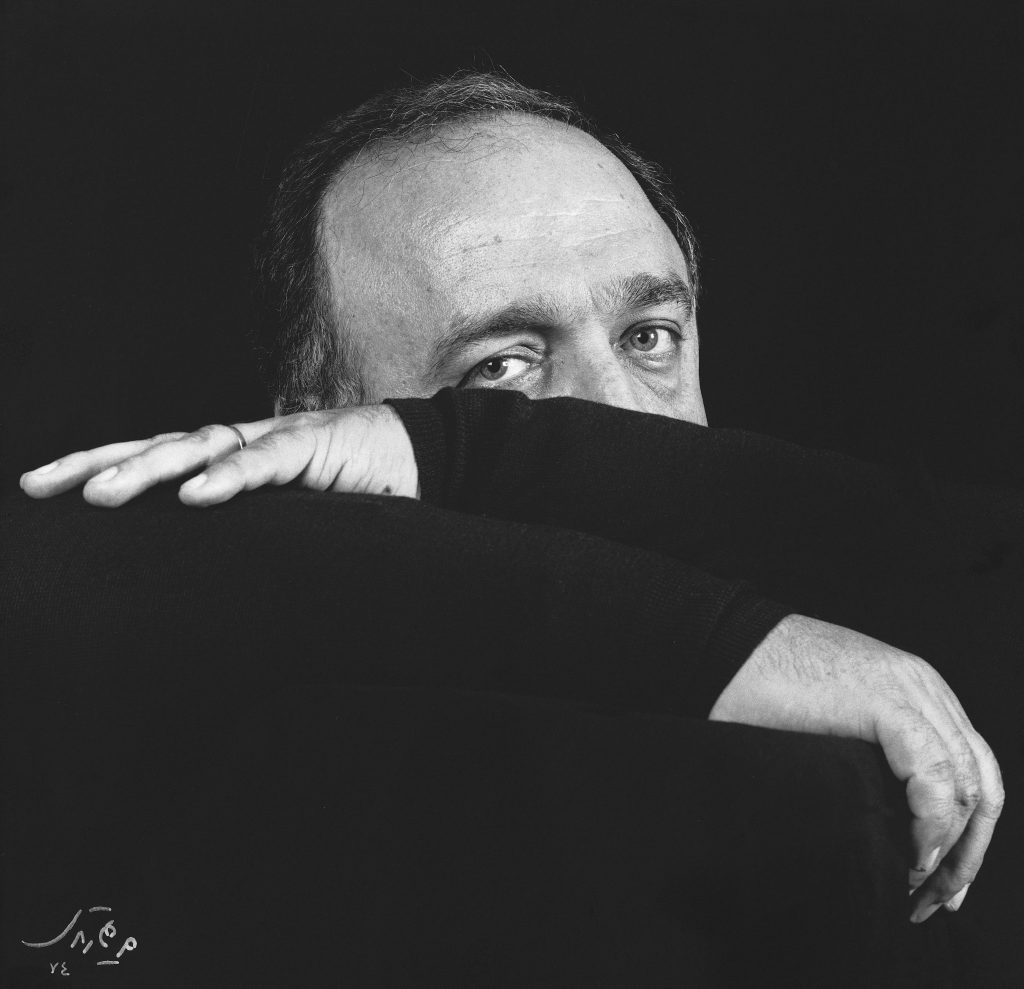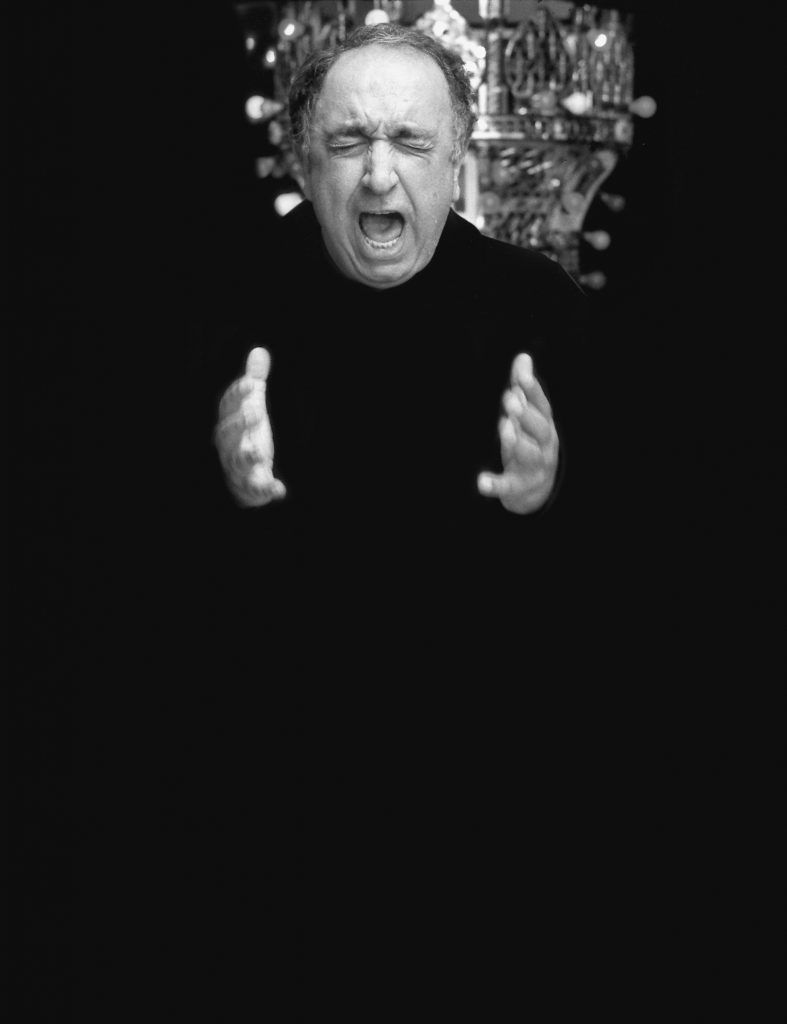
LIFE STORY
“I was three and a half when my brother Behrooz was born. On that day I went to my aunt’s house two blocks away from ours and knocked. My aunt opened the door: “My mother has just given birth to a new baby and doesn’t want me anymore.” I said to her.
This is the first memory Bahman the adult remembers of little Bahman. Prior to this incident what he has no recollection of, relates to the time when his parents had gotten married a few years earlier in Isfahan and their first son, Bahram had been born in the same city.
After the birth of Bahram, Mostafa Farmanara took his wife Aghdas al-Sadat Besharat and together with his family they moved to Tehran that offered better opportunities for him to pursue his greater economic aspirations. One year after this migration Bahman was born in Delbekhah alley of Amirieh street of Tehran. In childhood due to frequent illnesses, unlike other kids he did not go to preschool but his interest in theatre, films and literature surfaced in the same times. Upon entering elementary school this interest intensified. He wrote essays for most children of the family and in gatherings he performed plays for them. Childhood years were spent as such; study, play and books. In adolescence he spent the first three years of high school in Elmieh School right behind Sepahsalar Mosque. During the same years Mostafa registered Bahram and Bahman in Shokooh Language Institute located on Reza Shah street which became prelude for their later academic pursuit abroad. The first years of high school ended and time came to choose a major. Despite everyone’s expectations the young Bahman opted to study mathematics instead of literature and he kept the reason a secret. A simple yet profound reason. “All of my friends had majored in mathematics and I wanted to be with them. It mattered to me.” That choice and priority of keeping friends is still evident in his manners and life style.
To make a long story short, Bahman Farmanara went to England at age 16 (1958) to attend London Film School but back then they only offered acting, so he had no choice but to study acting. After a year and some when his father travelled to London to check on his sons and their state of affairs, he refused to accept acting as a major of study and in less than ten days he packed Bahman’s belongings and sent him to America so he would definitely study film directing. The young Bahman was admitted to the University of Southern California where he started to study filmmaking next to fellow classmates such as George Lucas and John Milius.
After graduation Bahman returned to Iran to visit his family and since he was subject to draft he voluntarily entered the military service. While a conscript in the army, upon his mother’s request he proposed for marriage and left his heart with Flor Labafinejad at first sight and married her. Nine months later, his first child, daughter Larisa was born.
In 1968 he joined the National Iranian Radio and Television as presenter of the two TV programs of Fanoos-e-Khial (Lantern of Fantasy) and Jahan-e Cinema (World of Cinema). Bahman Farmanara’s first films included two documentaries titled ‘Nowrooz and Caviar’ and ‘New and Old Tehran’. After the making of these two documentaries, in 1974 he started the making of his first feature film titled ‘Shazdeh Ehtejab’ (Prince Ehtejab). The successful debut screening of ‘Shazdeh Ehtejab’ in Tehran International Film Festival as a director’s first feature film opened new doors for him. Shortly after, he became director of the Iran Film Industries Development Company to produce significant films of the Iranian new wave cinema. ‘Gozaresh’ (The Report) by Abbas Kiarostami, ‘Kalagh’ (The Crow) by Bahram Beizayee, ‘Malakout’ (The Divine One) by Khosrow Haritash, ‘Shatranj-e Baad’ (The Chess and The Wind), ‘The Desert of the Tartars’ by Valerio Zurlini and ‘The Other Side of the Wind’ directed by Orson Welles are among the films he produced in those years.
In 1977 however, the love of filmmaking took him behind the camera again and this time he directed The ‘Tall Shadows of the Wind’. This film alike ‘Shazdeh Ehtejab’ is based on a novel by Hooshang Golshiri but the film was banned in the same year and continued to be banned from screening after the 1979 revolution to date.
The last film Farmanara produced prior to 1979 was ‘Dar Emtedad-e Shab’ (Along the Night) directed by Parviz Sayyad. At that time, it became the best-selling film in the history of Iranian cinema.
In 1980 he made a firm decision to immigrate from Iran and moved with his wife and three children, Larisa, Nima and Mani to France where they waited for seven months to complete procedures to immigrate to Canada. In those seven months of waiting he worked on a plan for a children and youth film festival in Vancouver at the library of the Canadian Embassy. Two weeks after arriving in Canada he offered the plan to the authorities which was well received and he became the president of the festival for two consecutive years.
In the same year, with a one hundred-thousand-dollar capital he started a company by the name of Gruner Films and as the company director went to Cannes Film Festival and bought the film ‘Man of Iron’ by Andrzej Wajda. A few days later when Farmanara left Cannes for Paris, he read in the morning papers that the film had won the Palme d’Or. This direct shot at the target clarified for himself and others that he had stepped in the right path. This time a Canadian investor recruited him to manage a new company that had offices both in Vancouver and the U.S. He also bought Truffaut’s last film and some other films by Goddard and Alain Resnais.
Four years later he returned to Iran to handle the family business affairs but on the way back to Canada while at the airport he was informed that he was barred from leaving the country. It took him two months to clear charges and when he returned to Canada he found out he had been replaced by another person to manage the company. He filed a suit against the company which he won in court.
A while later, Cineplex Odeon Films that had grown to become a giant company owning the chain Odeon cinemas and some one thousand and eight hundred more theatres in North America, recruited him to work with them. Farmanara accepted this rare offer and moved to Los Angeles. In those years they produced films such as ‘The Last Temptation of Christ’, ‘The Glass Menagerie’, ‘Mr. and Mrs. Bridge’, ‘Madame Sousatzka’ and ‘Talk Radio’.
After a few years Farmanara stopped working with Cineplex and started his own personal company titled Open City, however because of his return to Iran the company was short-lived.
Bahman Farmanara returned to Iran after ten years by his father’s request to manage the Pileh Factories but he relentlessly continued writing film scripts and sent them to the Ministry of Culture and Islamic Guidance to receive production permits. In ten years he submitted ten scripts to no avail until in 1999 the script ‘Smell of Camphor, Fragrance of Jasmine’ received production permit.
Farmanara’s first feature film after eight years won him eight Crystal Simorghs (Phoenix) at the Fajr International Film Festival. Two years later his next film ‘The House Built on Water’ was screened with much controversy and won Crystal Simorgh for best film. ‘A Small Kiss’, ‘Earthbound’, ‘I want to Dance’ and ‘Tale of the Sea’ also made it to the screen one after another.
Nowadays, Bahman Farmanara is in his eighth decade of fruitful life, He wakes up at seven every morning and goes to his office on Sarhang Sakhayee Street. Every day he thinks of the next film script and writes. His greatest preoccupation: “We have to start shooting asap.”
“To me retirement doesn’t mean anything. It didn’t for my father either. My father started to learn Spanish at age eighty-five.”.
